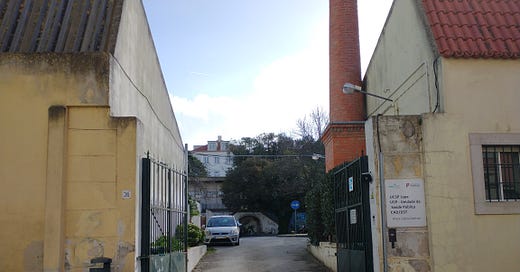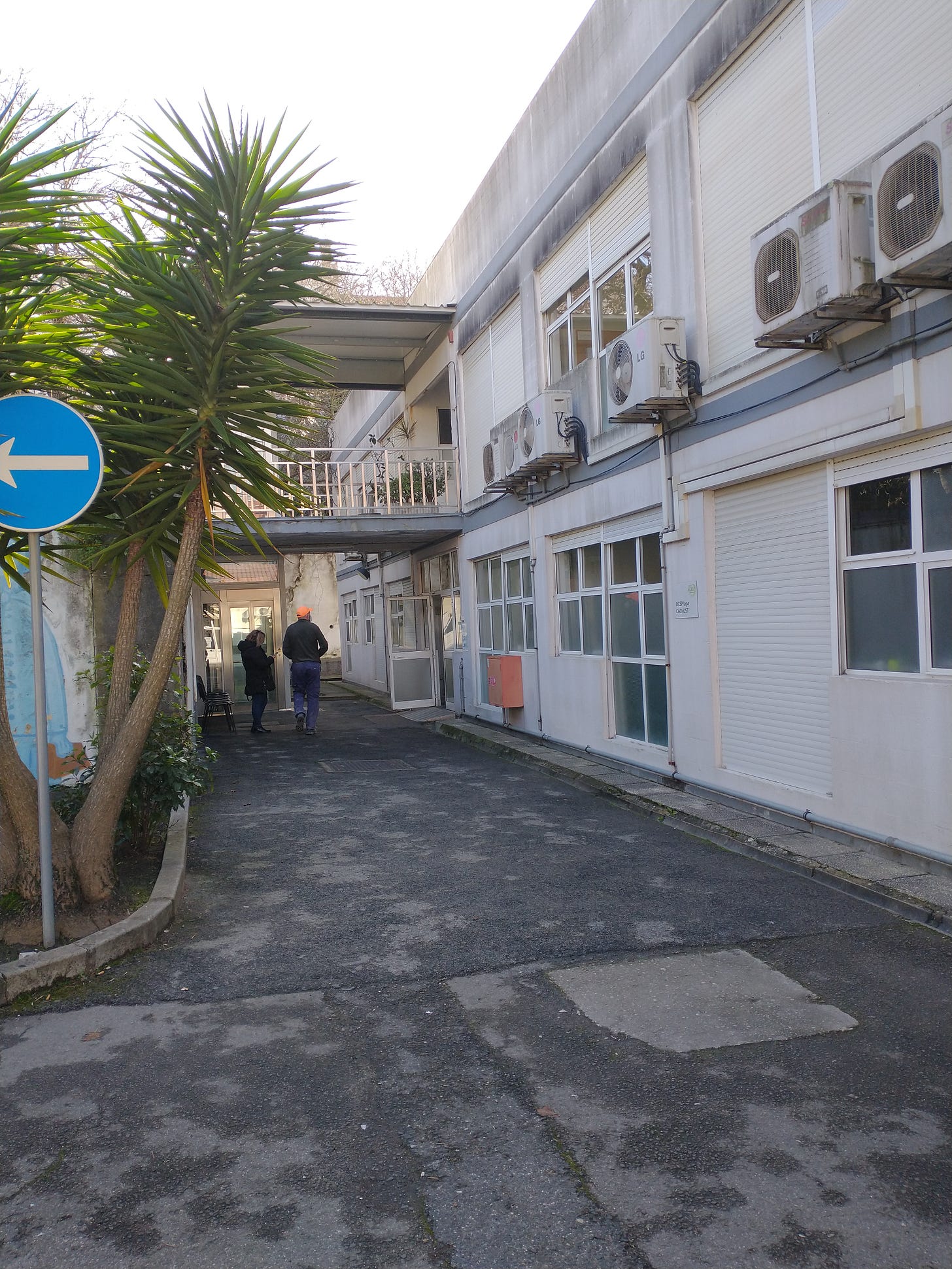There are two parallel systems of health care in Portugal: public hospitals and clinics that are funded by the federal government and private hospitals and medical facilities.
Private hospitals cannot provide the same breadth of procedures or surgeries that public hospitals do - they don’t have the same facilities, particularly in the area of emergency medicine - but they offer most of what the average person will need. Interestingly, a doctor can practice simultaneously at both public and private hospitals and/or clinics. Literally the same people offer in many cases the same treatments at radically different price points.
Most resources tell us two things:
Using the private system is more likely to result in
shorter time between calling for an appointment and seeing a doctor, particularly specialists
a better chance at doctors who speak English
People like us who haven’t been paying income taxes for decades shouldn’t be taking advantage of the public system, which is really meant for lifelong residents of Portugal rather than newcomers.
To address the second point (the rest of the post will cover the first), the counter-argument we’ve heard is that all taxes, not just income taxes, help support the public health system. And the taxes in Portugal are high. It is harder to notice because they’re baked into the prices on goods and services - it’s actually one of the more refreshing things about being here: when we see a price on something (a shirt, a carton of eggs, a can of New York Style Cheeseburger Flavour Pringles), that’s the price we pay - but they’re there. Examining grocery receipts reveals that some items are taxed at 6%, others at 23%. Yes, 23% sales tax. And our understanding is that 40% of our rent goes to the government. Yet we’re still paying the same or less here as we did in the US for most goods and services. So we are supporting the public health system. We just haven’t been doing it all of our lives.
When we first arrived in Portugal, we were not eligible to use the public system. Could we have gone to an emergency room at a public hospital and gotten treatment for an accident or sudden illness? Yes, of course. But making an appointment with a doctor in the public sector doesn’t happen without a número de utente (user number), also called an SNS (Serviço Nacional de Saúde - National Health Service) number.
Like any bureaucracy anywhere in the world, there’s a process to get that number. Only two documents are required to obtain it, though. First, nothing happens in Portugal without a Número de Identificação Fiscal (NIF). Like, nothing. Anytime money changes hands, the NIF comes into play. It’s the first thing required to begin the process of applying for a Visa to move to the country, a taxpayer ID that puts the recipient on the government’s radar. We had those months before we arrived in Lisbon. The second document is a residence permit, which is what we had to wait for. After we had our appointments with Serviço de Estrangeiros e Fronteiras (SEF, the Portuguese immigration service), we got to work on our SNS numbers. It’s a relatively simple process - we did it all by email - and it only took a couple of days. Our numbers were issued in early November, roughly five months after we’d arrived.
By then, we’d had plenty of experience with the private medical system here. We’ve seen everything from docs who studied in the United States to docs who are listed as speaking English but neither of us can make heads or tails of what they are saying and we end up resorting to translation apps. (Which, btw, is a difficult way to discuss medical issues.) We’ve had docs who practice in huge, gorgeous, modern hospitals; tiny, posh clinics tucked away in apartment buildings; fancy, swank flats with expansive views of the historic center; and two dudes in a storefront.
Our sole visit thus far to a public doctor went as follows:
Rafaela, our person at Serenity - the company that helps expats understand and navigate the Portuguese medical system - got us back-to-back appointments with a doctor who speaks English at a clinic relatively near us. She told us on December 26 that our appointments would be on January 17. A three week wait to see a doctor? Amy once waited nine months for a GP in the United States. While Scott can make an appointment for his private GP online less than a week in advance, three weeks seems eminently reasonable for non-urgent situations. The variable we can’t account for is we have not seen a public specialist yet.
Finding this public clinic was a bit of a challenge, as they didn’t spend their money on signage. Fortunately there was a security guard hanging out in the entrance to the complex who was able to direct us to the right building.
They’re also definitely not spending money on facilities. The place looked like it had been built in the 40s - all cinderblock walls and linoleum floors - and when Amy went to use the bathroom, she found a toilet without a seat.
At the entrance another security guard helped us with the ticket machine and pointed us down a hall. But…. he didn’t give us the ticket. We followed his finger and found not one, not two…. but four waiting rooms? Ticketless and staring at a monitor, we finally went back to the guy who told us our doctor would call our names. Super. That just left us figuring out which room to wait in.
After about a half hour, a young fella called our names. This 30-minute wait at the public system compares favorably to our private doctors here, perhaps on the short side. In the United States Amy has waited 1.5 hours for a doctor. (Yeah, that was fun.) Amy routinely waits for 45 minutes to see her private Portuguese GP. Scott’s wait at his private GP was just under 30 minutes.
Rafaela had told us our doctor was female. This guy did intake, asked a bunch of questions (in perfect English), and went through all our issues, carefully typing medication information into his computer and really listening to what we had to say. He took our blood pressure, and unlike in either of our initial appointments with private GPs, he actually weighed us on a scale! OK. That often happens before the doc shows up to save the day. He was pretty thorough compared to many of the other doctors we’ve seen - even listening to Amy’s lungs after she talked about her breathing problems.
Eventually, we asked and it turned out he’s an intern. The supervising physician was in the next room. Dr. Intern kept leaving the room to convo with Dr. Doctor (the one time we glimpsed her, she seemed no older than he is), but we were very satisfied. Only problem is he’ll be gone in just a few weeks and we never actually met Dr. Doctor.
After the appointment we had some questions for the receptionist, and we needed to pay so we went back to the lobby and Mr. Ticket Machine punched in our information for us, giving us the ticket this time. We waited another 15 minutes or so before being called to the front desk. Where we hit our first real hiccup: she didn’t speak much English. (And not in the, “I speak a little English” which usually means “I’m 16 times more fluent in your language than you are in mine” way. She really didn’t speak much English.)
We managed to DeepL, mime, and write our way through getting Amy’s cellphone added to their system, and obtaining the email address we’d need to request new prescriptions. The system ground to a halt, though, when we asked how to pay for our appointment. No matter how we tried to pose the question, it didn’t seem to compute. Turns out that’s because we don’t have to pay to see a public doctor. Not a penny. We haven’t gotten out of a private doc’s office for less than 70€ and we paid that little only once (the private hospital GP charges 88€, specialists require 98).
Next, we get to see how prescriptions will work.
That’s all for now.
Love from Lisbon,
Scott & Amy









I have had 3 surgeries in the private system here and am very satisfied with the care. I hear your point about the VAT, but as we have driven up properties values, and have gutted cities with Airbnb apartments...I think the least we can do is pay for private insurance.